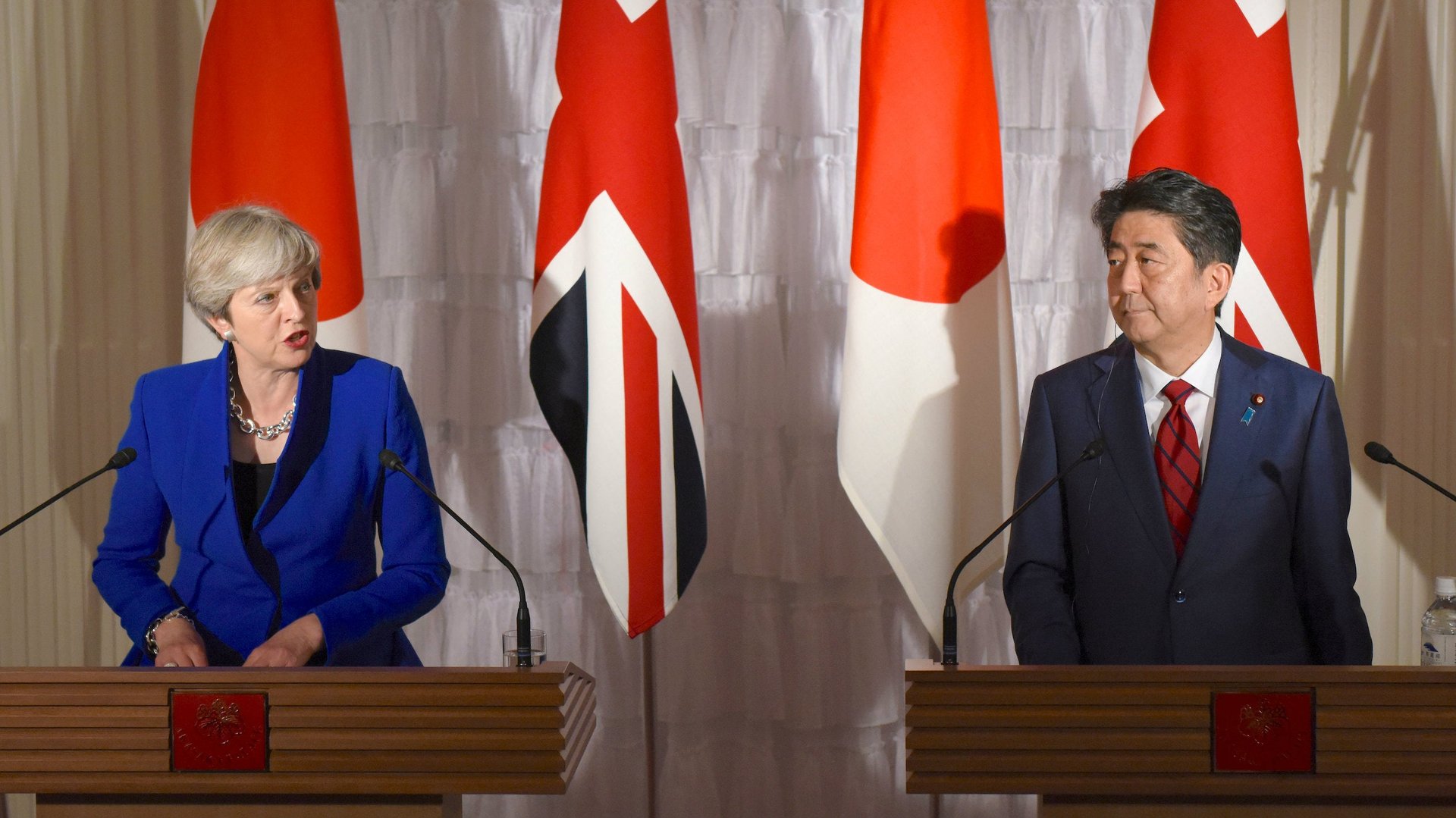Japan has the power to radically shape Brexit
Japan has a surprising amount of power over Britain to help shape a final Brexit deal, thanks to the dynamics of its existing trade relationship with the UK, as well as the possibility that it will make good on previous warnings to pull its business from Britain all together.


Japan has a surprising amount of power over Britain to help shape a final Brexit deal, thanks to the dynamics of its existing trade relationship with the UK, as well as the possibility that it will make good on previous warnings to pull its business from Britain all together.
Currently, the UK imports around $13.7 billion a year from Japan, making it the Asian nation’s 10th largest trading partner. There are also around 1,000 Japanese companies in the UK that employ 140,000 people, according to the Japan Business Federation.
We already know what Japan thinks about prime minister Theresa May’s mandate for a “hard Brexit,” a mandate for the UK to leave the EU’s single market so Britain can get out of the bloc’s immigration policies.
Japan’s Ministry of Foreign Affairs released a 15-page document exactly a year ago, addressing the potential damage to Britain’s economy if the UK leaves the single market. The Ministry took particular pains to point out that Japan has created 440,000 jobs in the EU, and that Britain’s success in attracting Japanese investment relies on its presence within the 28-nation bloc.
More ominously, Japan said its businesses and banks would “have to acquire corporate status within the EU anew and obtain the passport again, or to relocate their operations from the UK to existing establishments in the EU,” because Britain leaving the single market make Japanese businesses “face difficulties.”
In the year since the Ministry released the note, Japan has already started to make good on those warnings. Japan’s biggest bank, Mitsubishi UFJ Financial Group, is looking at Amsterdam in the Netherlands to relocate UK investment banking operations (paywall), while Nomura, Daiwa, and Sumitomo Mitsui Financial, are planning to move their main base for EU clients to Frankfurt, Germany.
Car giant Nissan said last year that it was eyeing relocating UK operations in the event of Brexit, but then surprised everyone when it said it would produce the new Qashqai and X-Trail car models in the English city of Sunderland. Nissan produces more than 475,000 vehicles in the UK a year, of which 80% are exported, according to the company’s chairman and CEO, Carlos Ghosn.
The UK government came under fire for how it convinced Nissan to make that commitment, after business secretary Greg Clark wrote to the company reassuring it that it would “remain competitive” post-Brexit. There were allegations of a “sweetheart deal,” but in Dec. 2016 the National Audit Office said there was no evidence that such a deal took place. However, at the start of 2017, Nissan noted that nothing was certain in the event of Brexit and it could still “adjust” its business, which puts 7,000 jobs in Britain at risk.
More recently, the true nature of what is going on between the Japanese government and Theresa May’s office remains unclear. Reports surfaced that Japanese ministers were too “polite” to tell May to her face that her approach to Brexit talks is making the country uneasy, which is in step with the attitude the government expressed in the document last year. However, at the end of the UK envoy visit to Japan on Aug. 31, Japanese prime minister Shinzo Abe said that his country would remain committed to Britain and, in joint statement with May, announced that the countries would forge a trade deal immediately after the Brexit process is finished.
Perhaps Japan said all that needed to be said a year ago, or maybe the country has been able to talk May and her government into seeking a softer Brexit deal with the EU that involves greater trade ties with the bloc, along with the attractive transition period that it was angling for in that initial document.
Only time will tell, but if Japan has convinced May to change direction, it would it be a huge win for the country and all other foreign interests that are looking to pull their business from Britain’s economy.